- Home
- William Styron
Selected Letters of William Styron
Selected Letters of William Styron Read online
Copyright © 2012 by Rose Styron
All rights reserved.
Published in the United States by Random House, an imprint of The Random
House Publishing Group, a division of Random House, Inc., New York.
RANDOM HOUSE and colophon are registered trademarks of Random House, Inc.
LIBRARY OF CONGRESS CATALOGING-IN-PUBLICATION DATA
Styron, William, 1925–2006.
Selected letters of William Styron / edited by Rose Styron, with R. Blakeslee Gilpin.
p. cm.
eISBN: 978-0-679-64533-7
1. Styron, William, 1925–2006—Correspondence. 2. Novelists, American—
20th century—Correspondence. I. Title.
PS3569.T9Z48 2012 813′.54—dc23
[B] 2012013783
www.atrandom.com
246897531
Frontispiece photograph: William Styron working on Lie Down in Darkness at Valley Cottage, on a tilt-top desk that had belonged to the radical journalist
Randolph Bourne. (PHOTOGRAPH BY SIGRID DE LIMA)
v3.1
Contents
Cover
Title Page
Copyright
Epigraph
Introduction
Postmark
Editorial Notes
William Styron: A Timeline
Selected Letters of William Styron
Acknowledgments
Other Books by This Author
About the Editors
All letters, old and new, are the still-existing parts of a life. To read them now is to be open when some discovery of truth—or perhaps untruth, some flash of light—is just occurring. It is clamorous with the moment’s happiness or pain.
—EUDORA WELTY
INTRODUCTION
READING BILL’S LETTERS has been a journey of surprise for me. As the originals and copies of the thousand-plus handwritten missives began to arrive from friends, colleagues, librarians, and others to whom I had sent hopeful queries about the letters’ existence, I opened them with excitement—but then, for a moment, might hesitate, feeling almost as if I were prying into a secret life, the life of a man I’d lived with and loved for fifty-four not uncomplicated years. The “secret life” wasn’t a different or parallel life—it was our life, one committed to paper, privately, enhanced for me now by a brilliant wordsmith with original thoughts and insights, with generous impulses and particular humor to particular persons he valued: family, close friends from childhood through middle age, writers contemporary and aspiring, mentors, Marine buddies, and neighbors and editors with whom he had deep connections over the years. What a gift! Suddenly, belatedly, I realized that half the endless hours I thought he was working on novels alone at one desk or another he was actually writing letters.
Bill wrote everywhere, it seems. When we met in Italy (a night in a bar with Truman Capote that burgeoned into a crazy romance), he was working in a small high room at the back of the palatial American Academy in Rome, the first fiction writer to be awarded its Prix de Rome. He was surrounded by painters, sculptors, architects, and musicians. Each morning, he said, he was roused by sounds from the Ping-Pong table on the terrace his window overlooked (Lukas and Cornelia Foss doing earliest battle). How different from the couple of years he struggled—even for food—in cheap, New York City rooms before Lie Down in Darkness became a bestseller.
Soon we moved in together: a dark basement flat next door to the Academy, where Giuseppe, its big uniformed doorman, would descend the steps to deliver Bill’s cherished mail. Bill piled books and yellow legal pads on a creaky kitchenette table, spending sunny days down there as I explored the parks and museums and wrote poetry—outdoors. Usually we walked alone or with Academy fellows down to Trastevere for supper. Next, after a snowy, dramatic car trip to meet the Paris Review crowd he had been part of months before in France, and a three-month split (I’d moved to Florence), we married at the Campidoglio, driving in May to Ravello, where we lucked into our glorious honeymoon pad, a newly converted jail with turquoise tiled floors that I practiced rolling out and cutting my pasta on. Bill (daily for eight months) sat at a round marble table by new French doors that looked out on a lemon grove and beyond: a steep view of the Amalfi coast whose beaches we walked down to between work sessions and visitors. One day, when Bill found himself stuck on the second chapter of a new novel he titled Blankenship, he declared he had to abandon Italy’s beauty and go back to New York and face a blank wall. Since he had told me repeatedly how he hated New York, I protested. Only once.
Just before Christmas we sailed third class, me dreadfully seasick on rough waters, Bill in the upper bunk still writing. After a New York reunion with expat Paris Review founders (George Plimpton had opened a New York office in his apartment and everyone followed), we rented a small apartment on East Sixty-first Street. Bill sat faithfully therein at a corner table in the too-pink bedroom until noise from the building being torn down across the street became unbearable and we fled to the quiet Connecticut countryside.
In Roxbury, we arranged to buy the first house we looked at, falling in love with a farm property last occupied by prominent Russians escaping the revolution of 1917 (their stream of long-term guests included Alexander Kerensky, dancers, writers—reputedly even a Tolstoy). We settled in the barn they rebuilt as a guesthouse. It was still inhabited by a Russian relative, a bachelor, who, scantily clad, opened the top of its scarlet Dutch door to peer at us that first day. He left us everything from the furniture to nineteenth-century Russian encyclopedias and medical books, and an album, vintage 1920s, whose photographs detailed construction work, family tea on the terrace, and tennis players in long white skirts and trousers and straw hats. Also: a tangled array of his personal sex paraphernalia in the closet next to Bill’s new desk. This smooth six-foot chestnut slab on metal legs, set against a wall in our loft bedroom, served him well for nearly forty years. All day I’d be with Susanna, our firstborn, adored by Bill, below in the living room or out on the lawn—my nursing efforts applauded by cows that would appear on schedule at the stone wall which bordered a dairy farm uphill. At dark, music would suddenly fill the house—symphonic Mozart, Bach, Beethoven, Brahms (or on light occasions, perhaps, folk songs, Southern ballads, lieder, or swing) and I knew our evenings together were about to begin.
A second child, Polly, and a huge Newfoundland, Tugwell, crowded us out three years later and we moved beyond the grape arbor to the big deserted farmhouse we had started to fix up. Opening old doors to small outbuildings—corncrib, toolshed, garage—I found remnants of a sort of Russian craft center with tapestries, jewelry, pottery, and rugs. The barn became Bill’s solitary studio (though summers it might be home to Philip Roth, or Donald Harington, and then, for thirty-eight years, long-term Virginia bon vivant Gray Beverly). The last dozen years or so of Bill’s life he transferred his workspace into the main house, taking over my large space, actually Polly’s old bedroom. He adopted my square white tilt-top desk and placed it near a window looking out on Alexandra’s backyard playhouse (the old corncrib she and her eight-year-old schoolmates once decided to paint, scared away when William Styron bellowed at them for spilling buckets of wild pink over its floors, steps, stone path, and lawn). It made a sweet quiet view, nestled in overgrown lilacs and untamed forsythia. Was Bill these days feeling lonely? Discouraged? Did he sense a worrisome decline?
Whatever, I was happy to have him close by. I still went off on certain missions for human rights and a birding trip or two, but much less often. I couldn’t forget that in 1985, when I was in Budapest planning to go with Timothy Garton Ash to Transylvania on a mission to meet with endangered dissidents, I called
Bill to say good-bye, knowing I might have been incommunicado for a week or two. Bill’s voice shocked me. He said he was crashing, to PLEASE come home immediately. I did.
Sometimes in the years after this, on the meditative walks he took with his favorite dogs before each day’s work, I might be invited along to stride with him down to Judd’s Bridge by the river or across to Upper County Road between meadows and cornfields. Immediately on return, he would hasten to his study, to reappear only at dinnertime, about 9 p.m., or for a drink an hour earlier in the large, high-ceilinged back room we added, its stretching bar the place where Bill would stand, most often alone, quiet, and spread out the day’s pages to contemplate. Rarely in later years did he read aloud the afternoon yellow-page compositions in his beautiful script as he had each evening of our first decades together, often by a fire he built. He’d stay up very late, revising. I would type (two fingers) the next morning as he slept. For years he’d want to discuss at least part of a chapter with me, and then with his treasured editor, Bob Loomis.
An inveterate note-taker but a poor correspondent myself, I was delighted to see Bill’s postcards and letters from 1967 to 2002 that detailed our leaving Connecticut quite regularly (en famille on school breaks), most often in winter, but often à deux. Bill hated cold weather. We might join the Robert Penn Warrens in Egypt, the James Joneses in France, the Sadri Khans in Kenya, the Carlos Fuenteses in Mexico, the John Marquands on Salt Cay, the Mike Nicholses or the Robert Brusteins sailing the Caribbean, or the Gabriel García Márquezes in Colombia, then Cuba. More serious missions—Poland with Kurt Vonnegut, Chile with Arthur Miller—were chronicled, too. Every summer we moved to Martha’s Vineyard, where Bill barricaded himself in a little prefab behind the house to write, posting an intimidating VERBOTEN sign on the door. Surely he was creating more than fiction.
Post office visits remained a fact of daily life. Walks to the main post office in Vineyard Haven before lunch and to the little auxiliary one in West Chop with a series of dogs in the afternoons supplanted his Connecticut drives to the small clapboard structure in the center of Roxbury.
Reading these letters, I was moved again and again by the love he expressed for me, for his children, for his friends. He was a kind, physically gentle man who flew into legendary short-lived rages at all of us; hung up the phone on his family’s callers, old and young, if they didn’t dare to schmooze with him first; invented mesmerizing horror stories to terrify and amuse his children at bedtime; got jealous of the considerable attention I paid to each child—especially, I guess, son Tommy—and would shout unpleasantries from his workrooms at their high-spirited noisiness or perceived misbehavior. By the time Alexandra, much younger, was growing up, his outbursts were becoming more intense. I did not see the handwriting on the wall: incipient depression. Only after he gave up alcohol at fifty-eight—a decision he stuck to as firmly as he had cigarettes at thirty-eight—did I realize disaster lurked.
An extraordinary thinker and artist, Bill put much on paper that he would never say aloud. Though immersing myself in his letters made me miss him more, respect and admire him more, as might be anticipated, it also sparked old doubts, and certain resentments, and regrets about my own responses in later years. Much of his youthful correspondence—which we had to eliminate because of space—made me wish I had known him as a boy—his language crafted so often with funny details of “fooling around.” A fourteen-year-old’s diary entry: “After supper wrote letters. Went to bed.” Discursive teenage missives sent from home and prep school implored recipients for a reply. One quoted an Eaton stationery ad: “To get a letter, send a letter.” Often he’d ask a relative to send him special stamps, and he wrote away for rare and exotic stamps himself.
YOU WILL SEE as you read these letters that his chief correspondents, those to whom he opened his mind and heart, were, first, his father, William Styron, Sr., then his Duke mentor, Professor William Blackburn, and his novelist friends such as James Jones, Norman Mailer, and Willie Morris. Others he was very close to, like Peter Matthiessen and Carlos Fuentes, rated only a few because he saw them or phoned them so frequently. Neighbors like Mia Farrow and Philip Roth, with whom we shared so many evenings, did find several: witty litanies about home life, or reassurances about books and performances. His thoughts on his own creative process and those of his fellow writers are profound, discursive, rich. Our eldest daughter unearthed one of the best batches. From age sixteen she frequently lived abroad. To Susanna the letters are humorous and compassionate, full of advice and comments, on family life at home, on news, world politics, and literature, and endless warnings to drive carefully. He shared much of his deeper self with her, as he did with his great friends whom he encouraged with fair and insightful criticism of their works-in-progress, or with readers requesting advice on mental health issues (many wrote back that his personal replies had helped save their sanity). Indeed, it’s stunning how often he wrote back to fans—how he loved his fans! It has been difficult to select. Thank heavens for Bob Loomis and Blake Gilpin and their judicious cutting.
So we begin with a series of letters to Pop, who supported him in every way after the death of his mother, from his early teen years through the advent of marriage. Unfortunately, we could not locate letters to James Baldwin, Bill’s close friend, who spent most of a year at our home in Connecticut in the sixties. Racial violence and the civil rights movement dominated the news. Bill and Jimmy would sit in the back room each evening discussing the books they were working on that year. Jimmy encouraged Bill to write Nat Turner in the first person. A number of black writers published objections to Bill’s inhabiting their hero. Though he won a Pulitzer and was supported by Jimmy and John Hope Franklin, Bill, a man who championed civil and human rights as well as fictional license, was hurt. And sad that the film, already in process and starring James Earl Jones, was canceled. It took more than a dozen years before the success of Sophie’s Choice, novel and film and opera, restored his sense of public appreciation.
Many stories are told in these pages, but inevitably some of the pieces are missing. As this goes to print, I suspect postcards and letters may still be on their way. In an electronic age of immediate communication, does anyone still correspond at such length? Alas.
ROSE STYRON
February 2012
POSTMARK
MY PERSONAL INTERACTIONS WITH William Styron were glancing, but they revolved entirely around his correspondence. For two summers, between the ages of nineteen and twenty-one, I served as the postmaster of a seasonal post office on Martha’s Vineyard. My one-room shop intersected one of Bill’s walking routes and throughout those summers, I could count on the occasional and nearly wordless encounter as he bought stamps for a postcard to Philip Roth or a package to Carlos Fuentes.
I imagined myself a budding writer and I anticipated our postal exchanges with great interest. I secretly hoped Bill would recognize me as a kindred spirit, but alas, we never muttered more than a few words to each other. I was left to thumb the addresses of his outgoing mail, daydreaming about the exciting literary world he inhabited.
Midway through my doctorate, I discovered Styron’s letters to one of my dissertation subjects, Robert Penn Warren. Styron wrote Warren in December of 1946, hoping to study “writing under [him].” This was the beginning of a long friendship, which grew especially close when the two became neighbors in the Connecticut countryside. After stumbling upon Bill’s letters to Warren, I began to investigate Styron’s friendships with Southern expatriates like C. Vann Woodward and Willie Morris. Chance had met opportunity and I was soon off to Durham, North Carolina, to explore Bill’s papers.
At Duke, in a beautifully organized archive, I found the story of a man, a writer, and an American century. Styron’s letters intimately document sixty years of his hopes and fears, narrating history that he not only witnessed but touched and changed. Like most writers, Styron explored the challenges of the act of creation in his letters. However, very few writers so powerful
ly probe the meaning of writing, the constant tug-of-war between a writer and the critical establishment, and the pains and joys of life itself. In other words, in these pages, you will find so much more than reportage about the events of daily life; these letters show the same attention to the human condition that allowed Styron’s writing to touch so many lives.
On the individual level, Bill repeatedly reached out to help aspiring writers, took the time to respond to fans who had been touched by his work, and wrote to nearly everyone in the same spirit as his epistles to close friends like James Jones and John Marquand. Particularly noteworthy in this regard are Bill’s letters to his eldest child, Susanna. One letter of note, from May 15, 1972, shows the affectionate thoughtfulness that characterizes his correspondence.
As for your existential “wrassling,” I’m sure that I don’t have to tell you that your pondering and wondering and troubling are only extensions of what people have been doing ever since they had the capability of thought, which is to say hundreds of thousands of years. Gods and the idea of a God were of course born out of just this troubled pondering, so it may or may not be a consolation to you that your intense wonder and turmoil about the meaning of the human condition is, in fact, a part of the human condition—or at least as it is experienced by sensitive and questing souls like yourself (no joke). It may just be that there is no reason or purpose to existence. Many great men—thinkers and artists—have thought this to be true, yet have not despaired over this assumption but have created great work through their very vision of mankind enduring triumphant over the sheer purposelessness of the universe, and in spite of the bleak and soulless aspect it so often presents. The whole concept of tragedy is of course embodied in this notion.
I am not aware of many parents who would take the time to write to their children with such care and profundity, much less treat the subject and the child with such humor, compassion, and respect. The historian in me revels in other examples. Writing to James Jones on August 12, 1965, Bill recalled writing Lyndon Johnson’s Voting Rights Act speech with Vineyard neighbor Richard Goodwin. That letter screams its importance, with juxtapositions of Jackie Onassis water-skiing, Frank Sinatra as a lifeguard, and Bill self-consciously announcing the letter as “Notes of a Waif Astray in the 20th Century.”

 Selected Letters of William Styron
Selected Letters of William Styron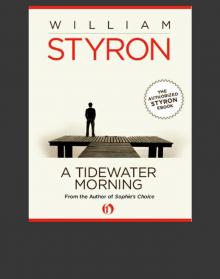 A Tidewater Morning
A Tidewater Morning Sophie's Choice
Sophie's Choice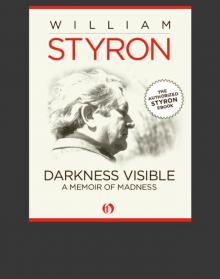 Darkness Visible: A Memoir of Madness
Darkness Visible: A Memoir of Madness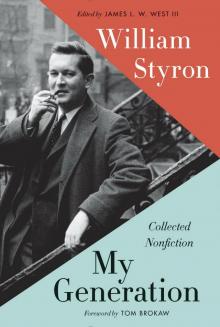 My Generation: Collected Nonfiction
My Generation: Collected Nonfiction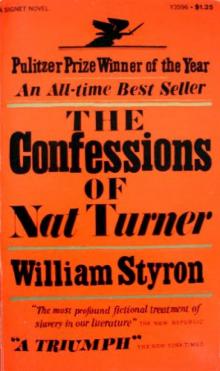 The Confessions of Nat Turner
The Confessions of Nat Turner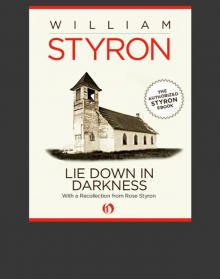 Lie Down in Darkness
Lie Down in Darkness The Suicide Run: Five Tales of the Marine Corps
The Suicide Run: Five Tales of the Marine Corps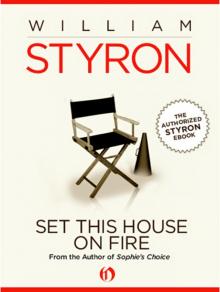 Set This House on Fire
Set This House on Fire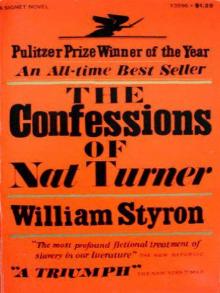 Confessions of Nat Turner
Confessions of Nat Turner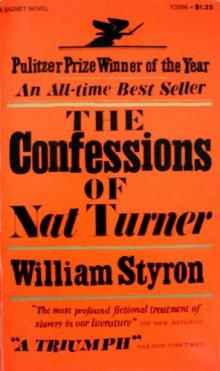 The Confessions of Nat Turner (1968 Pulitzer Prize)
The Confessions of Nat Turner (1968 Pulitzer Prize) The Suicide Run
The Suicide Run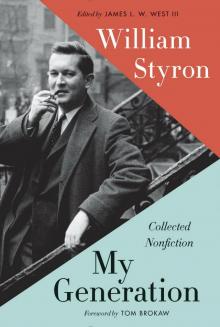 My Generation
My Generation Sophie's Choice (Open Road)
Sophie's Choice (Open Road)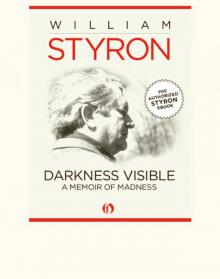 Darkness Visible
Darkness Visible